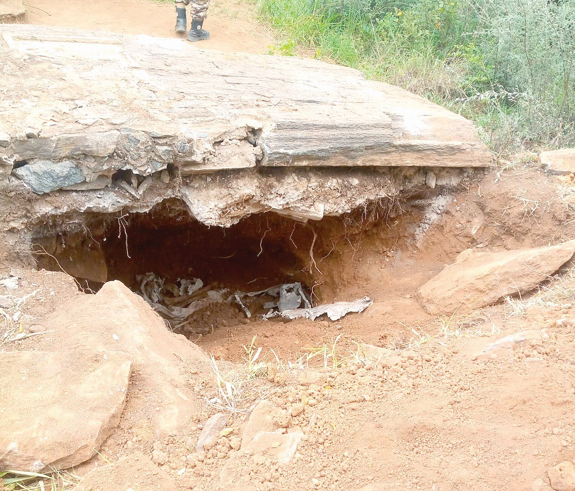Vandals dig up grave of pioneer British settler
By Zadock.Aangira, June 14, 2023Graves are considered sacred grounds and should never be disturbed, unless in exceptional circumstances.
Deliberate acts of destruction, theft or vandalism in places where people have been buried is not only prohibited by law but also considered a taboo in most Kenyan communities.
There are, however, isolated cases where graves have been looted, especially when the deceased are buried with valuables.
In a bizarre case on Monday evening, unknown people dug up Lord William Northrup McMillan’s grave at Ol Donyo Sabuk, Machakos county, almost a century after he was buried.
The grave lies on the high slopes of Ol Donyo Sabuk, overlooking their castle and Fourteen Falls in Thika.
Police said the contents of the corroded aluminum coffin was ransacked and left exposed after the grave located at the peak of the hill was dug up.
“The identity of the suspects and their motive are yet to be established. We have launched investigations. It is an offence to purposely or knowingly disturb the contents of any grave,” police headquarters said.
Memorial library
McMillan, the original owner of Juja Farm who first entered politics as a member of the Legislative Council for the Ukamba constituency, developed heart problems and died in France in 1925 at the age of 52.
His body was returned to Kenya and buried at a site he had chosen prior to his death on the slopes of Ol Donyo Sabuk. The place is now part of a national park.
McMillan and his wife were known for their philanthropy and financed the building of the YMCA, Scott’s Sanotorium and McMillan Memorial Library among other facilities. The wife built the library in his memory.
In addition to his vast property at Juja farm, he also purchased Ewart Grogan’s famous town house in Chiromo which is now part of the University of Nairobi Chiromo Campus.
Theodore Roosevelt, the 26th President of the United States, occasionally visited Juja Farm to rest and write one of his books. He first arrived there on May 13, 1909.
The American-born Kenyan settler, adventurer and philanthropist arrived at Kilindini Harbour in Mombasa on September 14, 1904 at the age of 32 from St Louis Missouri in the US.
He came into the country specifically to shoot rhinos and lions.
He then employed colonial pioneer Giovanni Destro to accompany him on his journey and along the way, he got interested in the area around Nairobi, and bought over 10,000 acres of land in Ol Donyo Sabuk from the British Crown and established Juja Farm.
He then constructed a five-bedroom house on the property.
The main house was followed by a three-bedroom manager’s bungalow, a two-bedroom bungalow, and three other bungalows housing the post and telegraph office, and rooms for chauffeurs and gardeners.
Before coming to Kenya, he had married Lucy Weber in 1894 after he left New Mexico where his father had sent him after he suffered a bout of bronchial infection.
McMillan, who inherited a lot of wealth from his father, was a keen adventurer, whose first expedition to Africa took place in 1902.
He was involved in an expedition to Ethiopia to ascertain whether the Blue Nile was navigable for which he was awarded two decorations from Emperor Menelik II.
Hosting President
On September 28, 1908 McMillan invited Roosevelt to be his guest when he came to East Africa at the end of his presidency.
Roosevelt accepted the invitation and arrived at Juja Farm on 13 May 1909, along with his son Kermit Roosevelt.
Roosevelt would return to Juja Farm on a few other occasions in 1909 to rest, write his book, Africa Game Trails, and correspond with his family and friends.
During a substantial portion of his stay in Nairobi, Roosevelt would also stay as a guest at McMillan’s townhouse located immediately behind the Norfolk Hotel, currently known as the Fairmont Norfolk Hotel.
During the First World War, McMillan renounced his American citizenship and enlisted in the British Army.
He went on to achieve the rank of Captain and used his wealth to assist the military in a number of ways, such as equipping a regiment at his own expense and utilizing his properties, Juja Farm and Chiromo Farm, as soldiers’ convalescent homes.
Heart problems
On February 6, 1918, he was knighted and was awarded the KCMG (Knight Commander of St Michael and St George) for his war time service.
Later in 1923, together with Lord Delamere, he established the European and African Trades Organisation, whose object was to train African artisans to take Indians’ places and discourage further Indian immigration into East Africa.
Due to his weight, he developed heart problems and pleurisy. He later died in Nice, France in 1925 at the age of 52.
His body was returned to Kenya and he was buried at a site chosen by him prior to his death on the slopes of Ol Donyo Sabuk.
They had no children and his wife continued to reside in Kenya after his death, and died on 4 September 1957 in Nairobi.
Though graves should be undisturbed, and the law prohibits opening of any repository of human remains, there are also cases where burial graves are reused due to rapidly expanding cities because of industrial revolution.
They may also be moved so that the land can be reused for other purposes.
However, in the case of McMillan, detectives are scratching their heads to establish the identity and the motive of the people who raided the grave.
